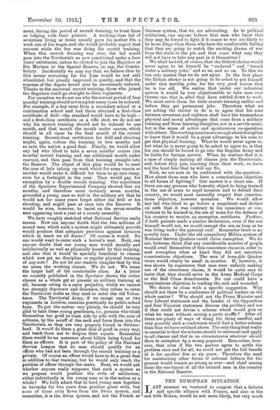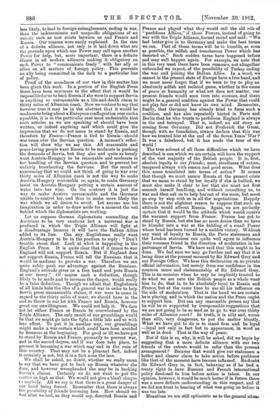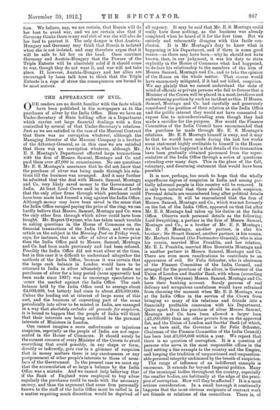THE EUROPEAN SITUATION. L AST summer we ventured to suggest that
a definite and specific alliance with France, and also in the end with Russia, would, be not more likely, but very much less likely, to lead to foreign entanglements, ending in war, than the indeterminate and unspecific obligations of an entente such as now exists between us and France and Russia. Our reasons were easily explained. In the case of a definite alliance, not only is it laid down what are the grounds upon which one Power may call upon another Power for help, but, more important, there is a definite clause in all modern alliances making it obligatory on each Power to "communicate freely" with her ally or allies on all matters of foreign policy. This prevents an ally being committed in the dark to a particular line of policy. Proof of the soundness of our view in this matter has been given this week. In a portion of the English Press there have been murmurs to the effect that it would be impossiblefor us to back Russia if she were to support Servia in anything so unreasonable as a life-and-death claim to thirty miles of Albanian coast. Now we venture to say that however true it may be in the abstract that it would be madnessto bring about a European conflagration over such a squabble, it is in the particular case most undesirable that such articles as we are speaking of should have been written, or indeed anything said which could give the impression that we do not mean to stand by Russia, and therefore by France—France is tied to Russia—should war come over the Servian question. A moment's reflec- tion will show why we say this. All reasonable and peace-loving people want Russia to be moderate in pushing the demands of Servis,, but they also and quite as keenly want Austria-Hungary to be reasonable and moderate in her handling of the Servian question and to prevent her unfairly browbeating the Servians. But the result of announcing that we could not think of going to war over thirty miles of Albanian coast is not the way to make Austria-Hungary reasonable or, again, to make Germany insist on Austria-Hungary putting a certain amount of water into her wine. On the contrary it is just the way to make Austria unreasonable and the Germans unable to control her, and thus to make more likely the war which we all desire to avoid. Let anyone use his imagination in order to draw aside for a moment the veil behind which the diplomatists are working.
Let us suppose German diplomatists counselling the Austrians to be very cautious lest a universal war is produced in which the Triple Alliance will fight at a disadvantage because it will have the Balkan Allies added to its foes. Can any Englishman really want Austria-Hungary to be in the position to reply : "Don't trouble about that. Look at what is happening in the English Press. It is quite clear that if it comes to war England will not support Russia. But if England does not support Russia, France will tell the Russians that it would be madness to provoke a war. Therefore we can quite safely push our advantage against the Russians. England's attitude gives us a free hand and puts Russia at our mercy." Of course such a deduction, though likely to be made and to increase the danger, would really be a false deduction. Though we admit that Englishmen of all kinds hate the idea of a general war in order to help Servia, press unreasonable claims, if war were to come in regard to the thirty miles of coast, we should have in the end to throw in our lot with France and Russia, however great our unwillingness. We could not help it. We dare not let either France or Russia be overwhelmed by the Triple Alliance. The only result of our grumblings would be that we might go into the fight a little late and so with less effect. To put it in another way, our grumblings might make a war certain which could have been avoided by firmness at the beginning For good or ill we have got to stand by Russia and France, primarily to prevent war, and in the second degree, and if war does take place, to prevent it becoming a war which may end in the ruin of this country. That may not be a pleasant fact, indeed it certainly is not, but it is a fact none the less.
We shall be asked, no doubt, whether we really mean to say that we have got to back up Russia whatever she does, and however wrongheaded she may be in backing Servia,'s claims. Certainly we do not want to put the matter as high as that. We would not give a blank cheque to anybody. All we say is that there is a great danger of our hand being forced. Remember that there is always the possibility of friends becoming foes. How should we feel after we had, as they would say, deserted Russia and France and played what they would call the old role of "perfidious Albion," if those Powers, instead of going to war with the Triple Alliance, turned round and said: "We had better give in to Germany and make the best terms we can. Part of those terms will be to humble, as soon as possible, the selfish and treacherous Power which has deserted us." Such sudden turns have happened before and may well happen again. For example, we note that in this very week there have been rumours, not altogether unfounded we expect, of the possibility of Turkey ending the war and joining the Balkan Allies. In a word, we cannot in the present state of Europe have a free hand, and we must never forget that if we were to try to play an absolutely selfish and isolated game, whether in the name of peace or humanity or what not does not matter, our present friends would soon turn into enemies, and there might be a general coalition against the Power that could not play fair or did not know its own mind. Remember, finally, that Germany has already tried to form such a coalition, and has also repeatedly hinted in Paris and Berlin that he who trusts to perfidious England is always in the end betrayed. That is, indeed, an old story as coming from Germany. Did not Frederick the Great, though with no foundation, always declare that this was how we treated him at the end of the Seven Years' War ? It was a falsehood, but it has made the tour of the world !
The true solvent of all these difficulties which we have described is one which we are certain will have the support of the vast majority of the British people. It is, first, absolute loyalty to our friends; next, steadiness of action, tempered always with reason and good sense. What does this mean translated into terms of action? It means that though we must assure Russia at the present crisis that we mean to stand by her loyally if she is bullied, we must also make it clear to her that she must not first commit herself headlong, and without consulting us, to war and then ask us to help her out of the mess, but must go step by step with us in all the negotiations. Happily there is not the slightest reason to suppose that such an attitude would affront Russia. Again, we are perfectly certain that it would be the attitude which would receive the warmest support from France. France has got to stand by Russia, but she has no more desire than we have to blunder into a war at the bidding of a small Power whose head has been turned by a sudden victory. Without any want of loyalty to Russia, the Paris statesmen and the London statesmen can quite well agree to influence their common friend in the direction of moderation in her patronage of Beryls. We have said that this ought to be done. We feel sure we may go further and say that it is being done at the present moment by Sir Edward Grey and our Foreign Office. We base this declaration on no private official information, but merely from our confidence in the common sense and statesmanship of Sir Edward Grey. This is an occasion when he may be implicitly trusted to do what we are sure the British people as a whole want him to do, that is, to be absolutely loyal to Russia and France, but at the same time to use all his influence on the side of moderation. That is the hand we are certain he is playing, and in which the nation and. the Press ought to support him. But can any reasonable person say that he will be so supported by irresponsible suggestions that we are not going to be so mad as to go to war over thirty miles of Albanian coast? In truth, it is silly and, worse than silly, very dangerous, to put the matter bluntly. What we have got to do is to stand firm and be loyal —loyal not only in fact but in appearance, in word as well as in deed. That is the way of peace.
But if this is so, why, it will be asked, did we begin by suggesting that a more definite alliance with our two friends of the entente would be safer than the present arrangement ? Because that would give our statesmen a better and clearer claim to take action before problems like that of the moment have become inflamed. No doubt Sir Edward Grey is, in fact, behaving as if he had a treaty right to have Russian and French international policy disclosed to him before action is taken. In our opinion, however, it would be much better if in future there was a more definite understanding in this respect, and if we did not trust to hearing of what was going on before it was too late.
Meantime we are still optimistic as to the general situ* tion. We believe, nay, we are certain, that Russia will do her best to avoid. war, and we are certain also that if Germany thinks there is any real risk of war she will also do her best to prevent it. The only danger is that Austria- Hungary and Germany may think that Russia is isolated when she is not isolated, and may therefore argue that it will be safe to hit her on the head. Once convince Germany and Austria-Hungary that the Powers of the Triple Entente will be absolutely solid if it should come to war, though they do not want it, and war will not take place. If, however, Austria-Hungary and her allies are encouraged by loose talk here to think that the Triple Entente is a rope of straw the consequences are bound to be most serious.




















































 Previous page
Previous page